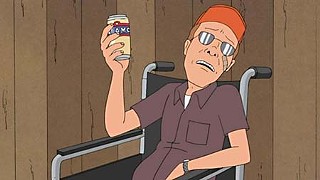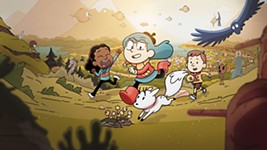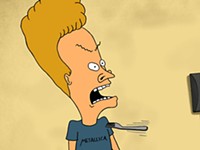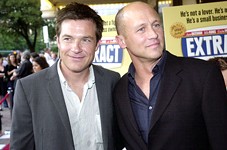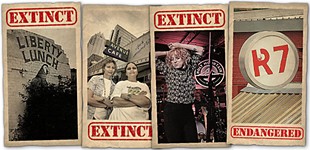The World Is Flat
How 'King of the Hill' helped make Texas three-dimensional again
By Cindy Widner, Fri., Sept. 11, 2009
"I just don't understand why you wouldn't want to compete on a state level, especially when that state is Texas." – a baffled Hank Hill to son, Bobby, in the series finale of King of the Hill
It's the last day of August, Rick Perry is on a tear, and Rachel Maddow is going relatively ballistic.
Nothing really ruffles the wonkish pundit, it's true, but as these things go, the idea that the Texas secession movement could gain some mainstream traction has her fairly frothed.
Interviewing The Dallas Morning News' Wayne Slater about some psychotic Texas Nationalist Movement rally at the state Capitol, she asks, with only a soupçon of condescension, if it's "even possible" to seem too extreme, "politically, right now in Texas," and if Perry "would support there being a referendum on secession or there being some sort of formal debate of it in the Legislature."
No stranger to shaping his Texpertise for mass consumption (see Bush's Brain and Alexandra Pelosi's Journeys With George, for starters), senior political writer Slater gently disabuses her of the notion, explaining that Perry's strategy is "rhetorical" – something a Rhodes scholar can surely appreciate – and at the same time gets in some swipes of his own ("I guess 'enlightened Republicans' in Texas means the ones that go to NASCAR but don't put the Confederate flag on the window of their car").
Well, that's showbiz – which almost always involves reducing a complicated situation to its most frightening and laughable components. Still, it can be tiresome to live in one of the few states (hello there, Florida) that reliably serves as a national punch line.
Almost as infuriating as the firsthand knowledge that many of those stereotypes land pretty close to the truth are the craven disavowals of liberal creative-classers ("I don't live in Texas; I live in Austin") and sycophantic piling-on, usually by expatriates or coastal sophisticates who enjoy thinking they're the smartest people in the room, mucking about in the hokum, and interpreting the exotica, then distancing themselves when it gets a little intense. By the time things have escalated to such a ridiculous pitch, we're too tired to bring up John Henry Faulk or Billy Lee Brammer or Barbara Jordan or Robert Rauschenberg or even our excellent highway system. For many of us, being a Texan – by choice or by happenstance – is a torrid love-hate affair that never ends. And the comedy is built right in.
'I'm a Little Worried About Being a Slut'
Mike Judge didn't grow up in Texas, which might be why his animated series King of the Hill could dive into the state's indisputably singular mythology (really – are there a lot of swimming pools shaped like Oklahoma?) with dispassionate hilarity and affection.
As a regional comedy in a country where regional identity has largely disappeared, King of the Hill walks a fine, smart line, creating sort of site-specific characters and situations with transcendent appeal: patriarch and propane (and propane accessories) salesman Hank Hill; no-nonsense wife Peggy (a substitute Spanish teacher and Boggle champ); and their odd, round son Bobby, who shows no interest in sports or cars and wants to be a prop comic; along with Hank's sidekicks Dale, Bill, and Boomhauer and assorted neighbors, strangers, relatives, friends, and nemeses – all grappling with the surprisingly interesting minutiae of their lives in Arlen, Texas.
Writer-driven and meticulously researched, King of the Hill delivers laughs in the form of subtle utterances and keenly observed details, realized through the cast's considerable vocal talent; it's humor with a long half-life – a trait it shares with Judge's live-action films (Office Space, Idiocracy, Extract).
Like animation bar-setter The Simpsons, King of the Hill is also a working-class comedy. Given Judge's demonstrated willingness to go for the jugular – particularly that of a well-meaning, clueless upper-middle class – and his own periods of being less than flush, one wonders if, left to his own devices in a less inherently collaborative format, he would have made the show a little meaner and the central characters a little less obviously heartwarming, making viewers confront their biases and work a little harder to embrace them.
It was, after all, co-creator Greg Daniels (now the creative force behind the American The Office) who came up with some of the more fanciful, as well as gut-punchingly hilarious, characters that make Hank the model of reason and empathy by comparison: conspiracy theorist Dale Gribble, gullible trailer queen/Luby's namesake Luanne Platter, and shinless, mean-to-the-core Cotton Hill, Hank's dad, among others.
Judge addressed this issue, kind of, in one of University of Texas Radio-Television-Film professor John Pierson's Master Class broadcasts on KUT recently. Essentially characterizing Beavis and Butt-Head as his Beverly Hillbillies, a show in which "nobody is portrayed positively" (and one that he greatly admires), Judge likened King of the Hill to Leave It to Beaver or The Andy Griffith Show: class comedies in which most of the characters, despite their laughable flaws, have at least some redeeming qualities.
Relating that his role in King of the Hill naturally lessened over the years, he added that the series could have veered too far into a sentimental direction for his taste or to stay true to the original tone and that a large part of his job in its later years was "trying to get ridiculous Garfield smiles off Bobby's face."
King of the Hill's series finale airs this weekend, after 13 seasons (more or less – some seasons were truncated by long-running sports events and aired later as new, shorter seasons), with back-to-back episodes: "The Boy Can't Help It," in which several popular girls, Heathers-like, toy with Bobby's affections, and "To Sirloin With Love" – an instant classic that explores Bobby's natural meat-grading abilities. Both involve such series mainstays as fundamental goofiness, small-town kicks, copious amounts of beef, and the father-son relationship, tying up the series without making a big deal of it.
At the end of it all, you'll be happy to know, that boy still "ain't right" (even before breakfast). Thank God, Bobby. Thank God. In honor of your adventures past and future and your family's, but mostly yours, we present this highly subjective, incomplete, opinionated King of the Hill retrospective.
Wematanye, y'all.
Texas, Our Texas
The megahit Seinfeld is mentioned more than once over the course of King of the Hill's run – partly, as Daniels points out, to locate Arlen in a contemporary moment, deflating the notion that it, or any small American town, could any longer be culturally isolated.
A more specific reason is that Seinfeld was at once universal and provincial – it was funny to pretty much everyone, but knowing the specifics of location threw in a subtextual kick.
Despite the fact that King of the Hill draws from numerous regional sources, particularly adjacent ones – a co-worker's wife can't even watch the show because Hank sounds, acts, and looks like her Oklahoman father; one storyline delves into Bill's Louisiana roots; and in "Enrique-cilable Differences," you could swear Danny Trejo's Enrique just flew in from northern New Mexico – everyone knows the place that gives it that kick is Texas.
Below, just a few of the ways King of the Hill addressed what Texana means now:
Willie Nelson worship. It's pretty hard not to love Willie: He's Texas with all the bad parts removed. He shows up early in the series, a victim of Bobby's wayward golf ball. When Bobby and Hank, who's named his guitar just like Willie and comes close to literally worshipping him, track him down to apologize (and to get his autograph), the godhead parties, relaxed and genuine, among the people. Just like in real life.
Ann Richards worship. Richards' sharp tongue, quick wit, political savvy, and joie de vivre made her, to many, the quintessential Texas lady. We're not really sure why Hank moons her in a glass hotel elevator, but we know why Bill Dauterive has a crush on Peggy, who shares many of Richards' qualities. It makes perfect sense that he and Richards are soulmates, at least for an episode.
The Dallas Cowboys. You can yammer all you want about the Houston Texans (or even the Oilers, if you're getting nostalgic): A Texan cartoon character would never root for anyone but the 'Boys. Even though he must live with the ever-spiraling absurdity of Jerry Jones' steroidal circus and being personally abused by a washed-up player, Hank will never stop confiding in his Tom Landry commemorative plate or singing the Cowboys fight song, Troy Aikman will always show up in the middle of a spiritual crisis, and there will always be next year.
Big Tex. Anyone who's been to the State Fair of Texas can attest to the plus-size creepiness of Big Tex, the giant mechanical cowboy who stiffly greets all comers with a booming "Howdy, y'all!" The episode "Girl, You'll Be a Giant Soon," in which Luanne and compatriots protest the fair's propane ban by holding a sit-in and dispatching from inside Tex's head, just takes that natural wariness to its logical, terrifying conclusion.
Lyndon and Lady Bird. In theory, Hank is a family-values Republican, but he's a Texan first. Not only is his dog named Lady Bird (putatively descended from the hound that tracked down James Earl Ray), but he has his doubts about both George W. and his father, at least compared to LBJ.
In "The Company Man," Hank shucks and jives for a Boston client named Mr. Holloway (who doesn't like LBJ because "he killed our Kennedy"), allowing himself to be called "J.R." and wearing a cowboy hat and boots despite his wide toes and the fact that he hasn't worn a hat "since a Texan was in the White House – and I don't mean George Herbert Walker Bush," until he finally puts his (aching) foot down, pointing out that "Texas has changed a lot since the 1850s" and that Holloway "can't even get [his] stereotypes right."
ZZ Top. Turns out Hank Hill is Dusty Hill's cousin. How 'bout that.
God, Guns, and Guts
"I didn't set out to do social satire," Judge said in Pierson's class; he told Terry Gross, on Fresh Air, that people perhaps made too much of politics in King of the Hill. Mostly, he said, it was about people who had lives to lead and things to do and didn't think about political matters a large part of the time.
That's all well and good, but the largely invisible, routine activities of the flyover states are exposed to great scrutiny and given huge political weight during election seasons (pretty much all the time, in other words). This anthropological work is rarely done by members of the tribes it examines and attempts to influence.
King of the Hill was hardly the first series, animated or otherwise, to take on religion (The Simpsons' legendary foot of God comes to mind), but it spent more time than most ferreting out the nuances of true believers, refurbished virgins, megachurches, hell houses, born-again skateboarders, Christian xenophobia, the football/prayer circle collusion, and real spiritual dilemmas.

Its genius at accomplishing authentic empathy through screamingly funny satire can be summed up in two words: "Manger Babies." The hard-loving but devout Luanne's insane, morality-teaching puppet show – which features traditional barnyard animals along with a six-legged octopus and a British penguin named Sir Reginald Featherbottom III – along with Hank's dilemma over playing God in her skit (costume: shaving-cream beard) on Super Bowl Sunday and Aikman's fourth-quarter appearance at the church, where he goes in the midst of a spiritual crisis ("Some guys were snapping towels in the locker room, so I went to Bible study to get some perspective on it"), rolls everything baffling about Bible Belt Christianity into an outrageous, lovable ball that you don't feel bad hugging. And laughing at. Because it's plain crazy. Funny crazy.
Bobby, meanwhile, serves as a walking challenge to traditional masculinity (a trait perhaps best encapsulated when he goes nuts after taking a women's self-defense class, screaming "I don't know you! That's my purse!" when confronted – though examples of his liberated gender identity are too numerous to detail here). At the same time, he's an ace rifle shot who shows up his dad at a father-son tournament, though they ultimately overcome the hurdle and experience some rare bonding.
Guns are everywhere in Arlen, so prevalent and taken for granted that, to my knowledge, there's not even an episode in which some progressive straw man or another recoils in horror and disbelief at their oppressive presence. When Bobby's talent is exposed and he and Hank go gun shopping, Bobby asks where the "children's gun section is" and if he can put a gun rack on his bike (words Hank says he's been waiting his whole life to hear). Several plots involve the local rifle club, and one character is killed in a gun accident.
While the writers don't exactly seem to be gung-ho about these realities – or at least ready to give them their full endorsement – they resist a dismissive, "clinging to their guns and religion" perspective; their take, complex and realistic, acknowledges the prevalence of manger babies and gun clubs in the world, sending them up while managing not to vilify them.
What's Up, Arlen?
The fictional burg of Arlen, Texas, is easier to pin down, geographically, than The Simpsons' notoriously placeless Springfield; nevertheless, its artful mishmash takes us all over the state.
Judge has said that the series' main characters were inspired by his neighbors in Dallas suburb Richardson, though North Texas' Garland and Houston-area Humble also claim influence. The background topography and evident distances from Dallas, the Gulf Coast, the Panhandle, and Texas-Mexico border – as well as a tell-tale square drawn on a background map in the second-to-last episode – indicate that Arlen is almost certainly a small town in southeast Central Texas (and, it should be noted, "One of George Bush's Communities of Excellence"). Certain pig- and sausage-related references in "Hank's Cowboy Movie" might even indicate that it's Elgin, straight-up.
Amarillo's Big Texan Steak Ranch, where if you eat a 72-ounce steak in an hour it's free, has been transplanted to Arlen, and the ability of Republicans and Wiccans to coexist in large numbers there is redolent of the Mid-Cities, also the real home to the Tom Landry Highway, LBJ Freeway, and the Bush Turnpike.
It's clear that McManorberry (note the long "a"; live here long enough, and you forget that's not how most people pronounce "manor") is roughly a stand-in for Austin, the closest large city to Arlen, but traces of the capital city show up in Arlen proper as well – notably in the "Arlen City Bomber" episode, which takes its plot from the notorious TXRD Lonestar Rollergirls/Texas Rollergirls split, and in "Lady and Gentrification," wherein hipsters descend on an affordable Hispanic neighborhood and drive up rents. And, of course, half of the series' action takes place on Rainey Street.
There's no shortage of real Texas cities to be name-checked, either (not to mention Whataburgers and Luby's – or, rather, "Luly's"). Peggy gets her size 16 shoes in Lubbock; in an early episode, Bobby accidentally kills (and resurrects) a whooping crane, which winters in Port Aransas (where Hank also takes his mother and friends to buy miniatures and inadvertently ends up in a spring-break nightmare). Wichita Falls fares less well, due to Hank's jealousy that it hosts the Cowboys' training camp, and is declared less "north Texas" than "south Oklahoma." Dallas and Houston get shout-outs and visits, to be sure, and Alamo beer could represent for San Antonio in a pinch.
But by and large King of the Hill travels far afield of the Texas everyone thinks they know.
And thanks to the Hills, Gribbles, Boomhauers, Platters, Dauterives, Redcorns, Souphanousinphones, and other citizens of Arlen, maybe we understand its complexities and contradictions a little better. If we're going to be a red state's red state, after all, we might as well be King of the Hill.
That's What She Said
The Simpsons made a phenomenon of the television vocal cameo, and King of the Hill is no slouch in carrying on that tradition. Here's a random and partial list of guest voices from 13 seasons: Ann Richards, Willie Nelson, Troy Aikman, Tammy Wynette, Snoop Dogg, Carl Reiner, David Cross, Jason Bateman, Pauly Shore, Betty White, Johnny Knoxville, Danny Trejo, Burt Reynolds, Sarah Michelle Gellar, Will Ferrell, Ben Stiller, Kathleen Turner, Bernie Mac, all three members of Green Day, Brendan Fraser, Brad Pitt, Owen Wilson, Renée Zellweger, Gary Busey, Jimmy Carter, Johnny Depp, Jeff Goldblum, Jeff Garlin, Pamela Anderson, Kid Rock, Lucy Liu, Lindsay Lohan, Henry Winkler, Marion Ross, Dusty Hill, and, of course, Tom Petty (who became the full-blown recurring character Lucky).
So-Called Facts/Government Propaganda
• King of the Hill debuted on the Fox network on Jan. 12, 1997, and almost immediately garnered significant ratings.
• The show is second only to The Simpsons as the longest-running American animated series.
• In 2007, Time magazine named it one of the Top 100 greatest television shows of all time, calling it "The most acutely observed, realistic sitcom about regional American life bar none."
• The show has won two Emmy Awards and has been nominated for five since its inception.
• Several episodes and members of cast and crew have been nominated for and won Annie (animation) Awards, as well as various other awards, including a GLAAD Media Award nomination for the episode "My Own Private Rodeo," in which Dale discovers his father is gay.
King of the Hill's two-episode season finale airs this Sunday, Sept. 13, at 7pm on Fox.






